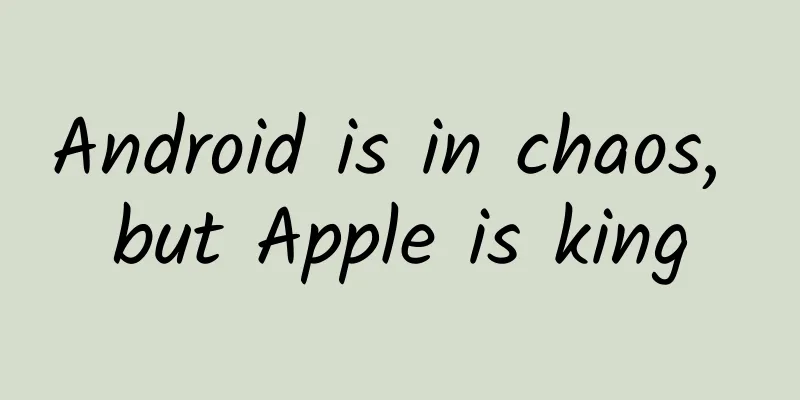Android is in chaos, but Apple is king

|
Do you have the same or similar feelings: The Android phone market experienced explosive growth in 2014. The processors of flagship phones are getting faster and faster, and the memory is getting bigger and bigger; the product lines of various companies are expanding, and Android phones can already reach the high price of 7,000 to 8,000 yuan, while reaping profits on the grassland of 599 yuan feature phones... As a result, if someone asks you to recommend a good mobile phone, you will probably recite these names: iPhone 6 and iPhone 6 Plus. There were so many Android smartphones launched in 2014, but it was hard to find one that could fully deserve the title of "good phone" that you would want to buy or recommend to others. Last year's Android market was so lively, but in the end, Apple still dominated. Why is that?
Samsung's Android landscape has been rewritten Before 2014, Samsung was the ruler of the Android market - both in terms of market share based on shipments and strength based on profits. In 2013, Samsung shipped 314 million mobile phones, reaching Apple's iPhone. The shipment volume was twice as high as that of the previous year. At that time, Samsung and Apple grabbed all the profits in the smartphone market - in fact, the combined profit ratio of the two companies was higher than 100%, because other major manufacturers, such as BlackBerry, Nokia, and Motorola at the time, were losing money. However, by 2014, the "Chinese power" represented by Huawei and Lenovo, as well as the "Internet phones" led by Xiaomi, which also came from China, and Motorola's cheap phones Moto G and Moto E were popular in emerging markets such as China, India, and South America - these are also the most important markets for smartphone penetration. These brands quickly achieved success by relying on low marketing costs, unique sales models, and relatively low dependence on operators. Their rise completely rewrote the pattern of the Android market and overturned Samsung's profit dominance within the Android pattern. The rewriting and subversion of the Android landscape by "Chinese power" and "Internet phones" did not result in a change of dynasty, but left behind a chaotic Android camp where no one can make money. Samsung Electronics' profitability, which relies on selling high-premium smartphones, has been declining, and finally fell to about 6% in the fourth quarter of this year. In the iOS camp with only one person, Apple took 88.7% of the profits of the entire smartphone industry, about $18.8 billion out of $21.2 billion. In the profit margins left by Apple for Android manufacturers (excluding Windows Phone, Blackberry, and Firefox), each company still has little profit to take, and Samsung has taken half of the remaining profits. In just one year, it has gone from sharing the profits of the smartphone industry with Apple to becoming the "next Sony." This is the current situation of the internal strife in the Android camp: Samsung has been dethroned, but there is still no new money-making player who can stand up and rule. What kind of mobile phone do you need? There is no doubt that smartphones are the closest companions of modern people and play an important role in people's digital lives. Smartphones are the first screen you see when you wake up and the last screen you see before you go to bed. In between these two time points, you need to use them to make calls, text or voice chat with people, send and receive emails, read, take pictures, record and watch videos, and play games. All smartphones can do these things, regardless of the operating system, but the iPhone will always do them better than Android — at least that’s what most people think. You can always find beautifully designed and powerful apps on iOS, and the latest designs and features of popular apps always appear on iOS first - because Android app developers need to adapt, debug and optimize for dozens of operating systems and screen sizes; Apple's customer support and system upgrade services for iPhone, such as usage tutorials, repair inspections and replacements, are also better than those of various Android manufacturers; the iPhone's back camera is not the one with the most pixels, but when it comes to the best camera phone, the first thing that comes to mind is always the iPhone, and very few people will think of Vivo, Nubia or Samsung. Even Sony, which provides camera components for most high-end smartphones in the world, ranks behind...
To put it bluntly, if you don't like to mess around, you need an iPhone once and for all, not a variety of Android phones. No matter how much RAM, how fast the processor, or how high the screen resolution, you only need an iPhone. The stable happiness that an iPhone brings you is far better than the highly customizable freedom of Android. The iPhone's "total" victory As the Android pie gets bigger and bigger, the market begins to be more clearly segmented by various functions and positioning. Some people make camera phones, some make Hi-Fi sound effects, some make "youth products", and some focus on business and fashion - but in the end, it is difficult for people to find a good, well-balanced phone in this market - a phone like the iPhone. The iPhone has a beautiful appearance, a smooth system, is more stable than Android phones (most of the time), has strong camera capabilities, runs games as smoothly as silk, is power-efficient, and has an always-beautiful screen... These are not all the compliments for the iPhone, but it can still be said that no Android phone can compare with the iPhone of the same era in these aspects, even if the latter has only 1GB of RAM, can only shoot 1080p videos, and has a battery of less than 2000mAh - it only reaches the configuration level of Android phones two or three years ago. As a result, Apple has been able to continue to sell iPhones at a price-discriminatory price, and its fans continue to flock to buy the latest model. In the most recent quarter when the iPhone 6 and iPhone 6 Plus were released, the latest iPhone models shipped 74.5 million units, helping Apple become the world's most profitable technology company - two years ago, this title belonged to Samsung, and now it is already struggling in the race against the "China Power". This all seems familiar In the Android mobile phone market dominated by Xiaomi, Lenovo and Huawei, manufacturers can increase shipments of mid- and low-end models at low prices, and reap profits as low as 3% and 2% from consumers with smaller purchasing budgets - Xiaomi is a low-price harvester; but no one can achieve the annual shipment volume of Huawei and Xiaomi in one quarter with high-end mobile phones priced at 5,000-8,000 yuan like Apple. This scene is very similar to the PC era of the past, when Windows PCs of various grades filled the low-end and mid-range markets. PC manufacturers Dell, HP, and Lenovo competed fiercely with each other, with only single-digit profits. Apple used a unified brand image and system optimization to obtain high premiums, almost monopolizing the high-end notebook market of more than $1,000. Even though each company has products that impact the high-end market, they cannot truly succeed in the high-end market like the MacBook. Now, no matter how Android phone manufacturers promote their products, the king of smartphones seems to belong only to the iPhone; no matter how Android manufacturers iterate their flagships, they cannot achieve iPhone-level success. Is there no hope for Android phones? Not really. Samsung and HTC have updated their flagships again at this year's MWC. Previously, Huawei, Xiaomi, Oppo and other manufacturers have all produced good products. Google Nexus and Motorola, which have unique styles, are also continuing their own paths. These brands of mobile phones have received good reviews from the industry and consumers. Unfortunately, with the internal turmoil in the Android camp, the biggest hope for Apple to challenge the iPhone's position head-on is probably that it will only mess up. |
<<: Hard constraints on software development
>>: Discussing the editing of game interactive texts from the perspective of six steps
Recommend
Mini Program Mall Development Company, how to make a mini program on WeChat?
Unconsciously, it is the "Double 11 Festival...
How many levels are there in Taobao Live? How to upgrade Taobao Live level?
This article mainly introduces the levels of Taob...
Samsung S8/S7e vs. iPhone 7: Full-screen wins
Lei Jun once predicted that there will be a full-s...
In the fierce battle of AI, which BAT can overtake others?
After nearly 20 years of development, the three l...
Attention! The sudden "improvement" of these 9 diseases may not be a good thing, but may also mean that the condition is more serious!
Many people would be very happy if a disease that...
If information flow advertising can achieve these 3 points, the effect will be reversed in minutes!
A page that can stimulate users' desire to co...
There are so many information flow advertising channels, how do you choose the platform that suits you?
Since 2018, more and more platforms have launched...
July new media operation and promotion hot calendar!
Whether it is new media, marketing, event plannin...
Operational planning for a product: the focus is on ideas, not writing plans
To put it simply, if you are given a product, how...
Analysis of advertising in the home furnishing industry!
As people's living standards improve, obtaini...
New media advertising operation, you must know these 7 promotion skills!
For operations personnel, whether you are doing u...
NetQin was repeatedly attacked by Muddy Waters because of the help of "insiders"
Recently, the US short-selling agency Muddy Water...
China Charging Alliance: Operation status of national electric vehicle charging and swapping infrastructure in October 2022
Electric vehicle charging and battery replacement...
Smart eating in winter - are the nuts you eat carbohydrates or fats?
Nuts can be said to be the protagonists of the wi...
To know your fortune in the Year of the Dragon, do a dinosaur fortune-telling!
China is the country with the most dragons - we a...









